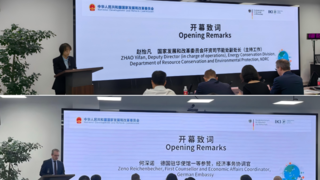Decarbonizing the cement industry through Sino-German demonstration measure on energy efficiency and CO2 reduction

On 10 October, the Sino-German Workshop on Energy Efficiency and CO₂ Reduction in the Cement Industry took place in Beijing. Co-organized by GIZ and the National Energy Conservation Centre (NECC), supported by the China Building Materials Federation, the event brought together policymakers, industry leaders, and experts in Beijing, marking the start of the Sino-German demonstration measure on energy efficiency in key industry. Representatives from the National Development and Reform Commission (NDRC) and the German Embassy in China set the stage with opening speeches. Prominent industry players, including cement giants like Conch, China Resources, and Huaxin, and German solution providers such as Siemens, KHD, Linde, and Allplan, shared valuable insights on the current state, challenges, and pathways for decarbonizing the cement industry.
The cement industry is a key sector with high energy consumption and carbon emissions, accounting for approximately 7-8% of global carbon emissions (Source: McKinsey & Company). China's cement production has accounted for about 50% of global output for many years (Source: CBMF). Both the Chinese and German cement industries face similar challenges in improving energy efficiency and reducing carbon emissions, such as the high investment costs associated with CCU/S technology, the high purchasing price of green electricity, the use of alternative fuels and raw materials, and the improvement of clinker production technologies.
The Sino-German demonstration measure in the cement industry enables effective exchange on challenges and solutions and will have a positive impact on the implementation of decarbonisation measures in the cement industries of both countries. This will be accomplished through a comprehensive needs assessment of cement companies, evaluating their potential for energy savings and carbon reduction, as well as examining best practices from both China and Germany.
This kickoff event served as a dynamic platform for representatives from the Chinese and German governments, cement industry companies, technology providers, financial institutions, and associations to exchange ideas and share expertise. Through engaging keynote speeches and expert discussions, participants delved into cutting-edge technologies and policies at advancing energy conservation and carbon reduction in the cement industry. These exchanges laid a solid foundation for implementing and scaling pilot projects under the framework of the Sino-German Demonstration Measures on Energy Efficiency in Key Industries, fostering cooperation and innovation in achieving climate goals.
About the Sino-German demonstration measure on energy efficiency in key industry
On 22 June 2024, German Vice Chancellor Robert Habeck and Chairman of the National Development and Reform Commission (NDRC) of the People's Republic of China Zheng Shanjie signed a memorandum of understanding on cooperation in implementing the Sino-German Demonstration Measures for Energy Efficiency Improvement in Key Industries (hereinafter “Demonstration Measures”), marking the official launch of the demonstration project in key industries.
The overall goal of the project is to establish pilot projects in the cement industry and industrial parks, promote innovative solutions and further improve energy efficiency and reduce carbon emissions. This cooperation is part of the concrete measures of the Memorandum of Understanding (MoU) on the establishment of a Sino-German Dialogue and Cooperation Mechanism on Climate Change and Green Transformation, signed by Federal Minister of BMWK Robert Habeck and the National Development and Reform Commission of China (NDRC) Chairman Zheng Shanjie in June 2023.